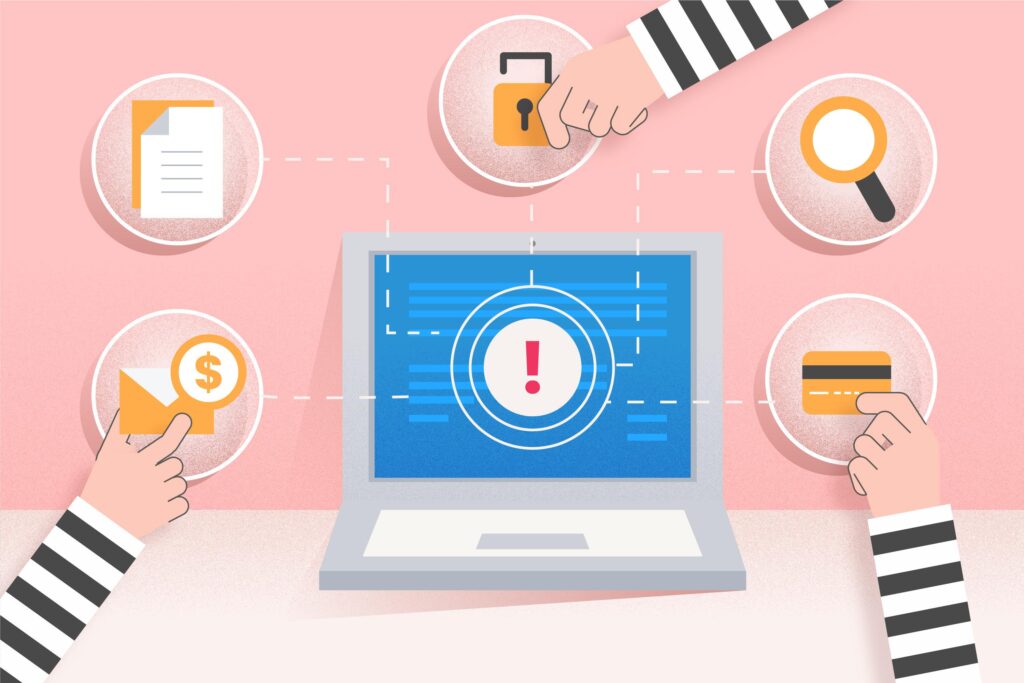As the internet continues to play an integral role in our lives, it has also become a breeding ground for online scams and frauds. Cybercriminals use various tactics to exploit unsuspecting victims, resulting in financial losses, stolen identities, and emotional distress. In this article, we’ll delve into some of the top online scams and provide you with valuable tips on how to avoid falling prey to them.

1. Phishing Scams
What They Are: Phishing scams involve fraudsters posing as legitimate entities, such as banks, government agencies, or reputable companies, to trick individuals into revealing sensitive information like passwords, credit card numbers, or social security numbers.
How to Avoid Them:
- Be skeptical of unsolicited emails or messages requesting personal information.
- Verify the sender’s authenticity by independently contacting the organization using official contact information.
- Avoid clicking on suspicious links or downloading attachments from unknown sources.
- Enable two-factor authentication (2FA) on your accounts whenever possible.
2. Online Shopping Scams
What They Are: Online shopping scams entice victims with attractive deals or products that are too good to be true. Victims make payments for items that either never arrive or turn out to be counterfeit.
How to Avoid Them:
- Shop from reputable and established online retailers.
- Read product reviews and check for customer feedback before making a purchase.
- Be cautious of deals that seem excessively discounted or unrealistic.
- Use secure payment methods, such as credit cards, which offer fraud protection.
3. Tech Support Scams
What They Are: Tech support scams involve fraudsters posing as technical support agents from reputable companies like Microsoft or Apple. They claim that your computer has a virus or problem and offer to fix it for a fee.
How to Avoid Them:
- Don’t trust unsolicited calls or pop-up messages claiming to be from tech support.
- Never grant remote access to your computer to an unsolicited caller.
- Contact the official customer support channels of the company to verify any issues with your device.
4. Romance Scams
What They Are: Romance scams target individuals through online dating platforms. Scammers create fake profiles and form emotional connections with victims before requesting money for various reasons.
How to Avoid Them:
- Be cautious of individuals who avoid video calls or in-person meetings.
- Don’t send money to someone you haven’t met in person.
- Research and verify the person’s identity using online tools and reverse image searches.
5. Investment and Financial Scams
What They Are: Investment and financial scams promise high returns on investments or offer exclusive opportunities but ultimately steal your money.
How to Avoid Them:
- Conduct thorough research on investment opportunities and financial advisors.
- Be skeptical of “get-rich-quick” schemes or unsolicited investment offers.
- Only invest with registered and reputable financial institutions or advisors.
6. Lottery or Prize Scams
What They Are: Lottery or prize scams inform victims that they’ve won a substantial sum of money or a valuable prize. However, they must pay fees or taxes to claim their winnings.
How to Avoid Them:
- Remember that you cannot win a lottery or prize you did not enter.
- Be skeptical of requests for upfront payments to claim winnings.
- Research the organization and verify the legitimacy of the prize before taking any action.
7. Job and Employment Scams
What They Are: Job and employment scams offer lucrative job opportunities, but victims are required to pay upfront fees for training, certifications, or equipment.
How to Avoid Them:
- Be cautious of job offers that require upfront payments.
- Research the company and job opportunity, and verify their legitimacy.
- Avoid sharing sensitive personal information without confirming the authenticity of the job offer.
8. Charity Scams
What They Are: Charity scams imitate reputable charities and solicit donations for fake causes. The money donated goes to the scammer’s pockets rather than the intended recipients.
How to Avoid Them:
- Verify the legitimacy of charities by checking their registration and financial transparency.
- Be cautious of high-pressure tactics or unsolicited donation requests.
- Donate directly through the official website or established donation channels.
Conclusion
Online scams come in various forms, but they all share the common goal of deceiving individuals and profiting from their trust or desperation. The key to avoiding online scams is skepticism, vigilance, and knowledge. Always verify the authenticity of individuals, organizations, and offers before sharing personal information or making financial transactions online. Staying informed about common scams and their tactics is your best defense against falling victim to these deceitful schemes. Remember that if something seems too good to be true, it probably is, and a healthy dose of caution can go a long way in protecting yourself from online fraud.